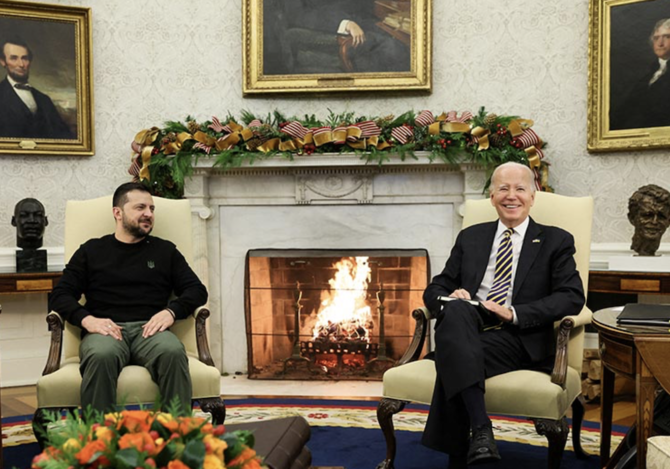Dr. Amal Mudallali
Ukrainian President Volodymyr Zelensky was in Washington this week, almost a year after his last visit, when he received a hero’s welcome in the White House and in Congress. This week, during his third visit since the war started in 2022, he discovered what a difference a year can make.
Despite the warm White House welcome, the Ukrainian president found a different Washington on Ukraine. He found that money is drying up, with the Ukraine aid package being held hostage in Congress and tied to the immigration and US border policy, with a strong right-wing Republican group in Congress that sees its national interest on the southern US border more than on a European border. He undoubtedly felt that support for Ukraine was falling after the failure of the counteroffensive to deliver what was promised to Washington, and a pessimistic assessment that the war has stalled. He also saw an election campaign that made everything, including Ukraine aid, a political tool in the tug-of-war between the Republicans and Democrats over who will occupy the White House next year.
But, most importantly, Zelensky must have noticed the change in the language of support even from his staunchest supporter President Joe Biden. Last year, the president welcomed Zelensky with a promise that the “American people will stay with you as long as it takes.” This week, the US leader vowed to “continue to supply Ukraine with critical weapons and equipment “as long as we can.”
The White House and the Ukrainian president were sensitive and concerned about the message that a dearth of US assistance sends to Russia and the world. Zelensky said that much at the white House when he warned that “the world is watching us,” and that if the aid does not come, Russian President Vladimir Putin could win.
Biden tied the aid to the credibility of the US, and urged Congress to approve the funding for Ukraine before the Christmas break, saying that otherwise they will give “Putin the greatest Christmas gift they could possibly give him.”
The White House invited Zelensky to help lobby Congress, which is blocking any additional aid to Ukraine, and tying it to the immigration policy and the southern border with Mexico following a record influx of illegal immigrants. Republicans in Congress question the policy of sending billions in aid to Ukraine in what they regard as a stalemate and a “war of attrition,” according to US media reports.
Last week, Republicans in the Senate blocked the White House’s request of its emergency spending bill requesting $111 billion that includes aid for Ukraine. The Senate vote was an indication of the dwindling support for Ukraine in the US. Polls show that most Americans oppose additional funding for the war with Russia, with 55 percent of respondents in a CNN poll saying Congress should not authorize more money for Ukraine.
The Republicans in Congress tied any authorization of aid for Ukraine to concessions from the White House on the immigration policy and the border with Mexico. Republican Speaker of the House Mike Johnson, when asked if Congress would approve aid for Ukraine, replied: “If they give us the border.” It is classic political horse trading, with Ukraine dragged into the fight. The border policy is an important issue for voters in this election year. Even governors of Democratic states are worried about the situation on the border, where a record 12,000 illegal immigrants entered the US in one day this month.
Zelensky made his case to Congress — telling them he needed aid “urgently,” and that a win for Putin “could be very dangerous” — but does not seem to have changed many minds in the entrenched Republican position. The House Speaker, who supports Ukraine, was skeptical, saying after meeting the Ukrainian leader: “We need a clear articulation of a strategy to allow Ukraine to win. And thus far, their responses have been insufficient.”
Sen. James Lankford, the lead Republican negotiator on the aid, reminded people after Zelensky’s visit that the US has its own national security issues as well. He said: “When we’re dealing with Ukraine, we’re dealing with Israel, we’re dealing with what is happening in the Indo-Pacific; we’re also dealing with what’s happening on our own border. We’ve got to be able to resolve that.” He is saying the US is overstretched.
Negotiations are continuing between Democrats and Republicans on the Hill, with Biden personally in regular contact with the Congressional leadership to push for a solution, according to the White House.
The White House is under immense pressure from all sides on this issue. Pressure from the Republicans who find this a golden opportunity to squeeze the White House for concessions on the border issue; pressure from progressives in the Democratic party who reject the Republicans’ strict approach to immigration and urge the president to resist; but, most importantly, pressure from the voters, with 64 percent disapproving of his border policy, according to a Wall Street Journal poll. In the face of all of this pressure, Biden is struggling to keep his Ukraine policy focused, funded and credible at a time when the situation on the ground is failing to inspire confidence that any of the war aims will be met soon.
Senate Majority leader Charles Schumer (D-NY) asked the Senate to return to Washington next week despite the Christmas holiday to try to reach an agreement on the border in order to free the aid for Ukraine. The Republican-controlled House adjourned. with the Speaker saying he was not going to ask people to stay in Washington “twiddling their thumbs,” when “they’ve not sent me anything,” meaning proposals.
Sen. Mitch McConnell said it is “impossible to pass the supplemental before Christmas.” But on Thursday night, two positive news items offered hope that an agreement might not be as elusive as it had seemed. Schumer’s request that the Senate come back next week to give negotiators time to reach an agreement coincided with the White House spokeswoman saying they are optimistic about a deal, and that the negotiations “are going in the right direction.” All indications were that the president is ready for a compromise. The question is, what will satisfy the Republicans?
Sen. Kyrsten Sinema, an Independent and one of the leading negotiators, said: “I can see the deal. We have a lot to do to get there, but I can see it.”
However, Republican leaders poured cold water on the optimism of their colleagues, with Sen. Lindsey Graham (R-SC) saying: “At the moment, a deal by the end of the year is just not remotely possible.” Graham said that he has not seen language to look at and that he is not going to “take the bait.”
A deal could be reached on the border and the aid, but the question is the timing. Time is a scarce commodity when you are fighting a war, as Zelensky impressed on Washington. The Ukrainian leader is learning the lesson of American domestic policy the hard way. But if he thinks things are so difficult for him now, he should not look forward to next year when the election campaign will overwhelm Washington completely.
Maybe the lesson for Ukraine, its president, and all involved is that when you are running out of money and time, it is best to change course. This conflict has gone on for too long, and a peaceful solution is overdue.







